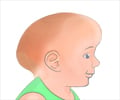Q: Which specialist should I consult to rule out Apert syndrome in my child?
A: You should consult a child specialist who will evaluate your child and make further referrals as needed. Treatment typically involves the combined efforts of a team of trained specialists, such as pediatricians, general surgeons, orthopedists, eye specialists (ophthalmologists), audiologists, ENT specialists, cardiologists and orthodontists.
Q: Did my child become affected by something I did during pregnancy?
A: No. Apert syndrome occurs due to mutation of the FGFR2 gene early in pregnancy but the reason is still not clear. Some studies suggest an advanced paternal age.
Q: Both my husband and I are normal; why did our child get Apert syndrome?
A: Most cases of Apert syndrome occur due to a new mutation occurring in the fetal FGFR2 gene with no prior family history. Such cases are said to be sporadic.
Q: If one parent is affected, what are the chances of having an affected child?
A: If one parent is affected, there is a 50% chance of your child being affected.
Q: Will my child be able to lead a normal life?
A: Your child can lead a near normal life with support and intervention from family members and a team of doctors who will address the specific needs of your child. Constant encouragement and support is critical to the child’s overall development.
Q: Will my child require to take any lifelong medications?
A: You have to discuss this with your doctor. He will guide you based on your child’s needs.
Q: I am told my son requires surgery to correct the defects of the face and skull. Will they help?
A: Most kids with Apert syndrome undergo surgery to correct the abnormalities of the face and skull and other involved organs. These will help normal brain growth and intellectual development and also correct other underlying disorders. Surgery is advised as a part of the overall management for the child’s all round growth and development and to provide an opportunity to achieve his/her potential.
Q: Who will be performing the surgery of the skull and face?
A: A skilled and qualified craniofacial team will be conducting the surgeries.
Q: What is the life expectancy in Apert syndrome?
A: Children who survive beyond childhood and do not suffer from heart disease will usually have an almost normal lifespan. Life expectancy has also improved with advanced surgical techniques. Following surgery, children can have a near normal life expectancy.
Q: What are some of the other disorders similar to Apert syndrome?
A: Other disorders with similar clinical features which may be considered in the differential diagnosis include Crouzon’s syndrome, Carpenter syndrome, Pfeiffer syndrome, Jackson-Weiss syndrome and Saethre-Chotzen syndrome.
Q: What are some of the organizations I can get in touch with for support and help?
A: There are many organizations you can contact for support.
- http://www.faces-cranio.org/Disord/Apert.htm
- [email protected]
- http://www.apert.org
- http://www.healthlaw.org
- http://www.thecraniofacialcenter.org Email: [email protected]











